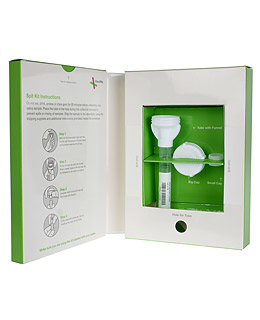The coming mass market for genetic sequencing


How about $100?
All kinds of genetic tests are becoming cheap as chips. The cost of testing labs is following Moore's Law down the cost curve.
(The genetic testing kit from 23andme to the right was called one of the 20 top inventions of 2008 by Time Magazine. The company's current price for a genetic test is $499, according to their Web site.)
While doing my own workout this morning I listened to a podcast of The Splendid Table interview a high school student who had tested New York foods. (The sheep's milk cheese came from cows, she said, and the sturgeon caviar was paddle fish.) Genetic tests are now standard equipment in all kinds of crime-fighting, not just murder cases.
But we are no longer talking about cheap tests that can tell cows from sheep, or can identify a father or criminal suspect. We're talking about gathering all your genetic details, and asking you to act on them.
Some doctors are asking ethical questions about this, concerned patients will demand cures for diseases they do not yet have.
What does it mean when genetic testing becomes a mass market? As Stanford bioengineer Stephen Quake noted after having his test done, "It's all bad news." Genes don't show happiness or athleticism. The results of a test usually tell you what you're likely to die of, and we're all likely to die of something.
As microfluidic devices come on stream, dropping the costs of a test to that of a good restaurant meal, some big companies are positioning themselves to take advantage. PerkinElmer has bought a genetic testing company, pitching "the early detection of disease."
The impact of a mass market is unclear. Genetic testing kits are now all over the Internet, with mass market labs like Quest Diagnostics already in the market.
The time for setting a policy on all this is here. What should it be?